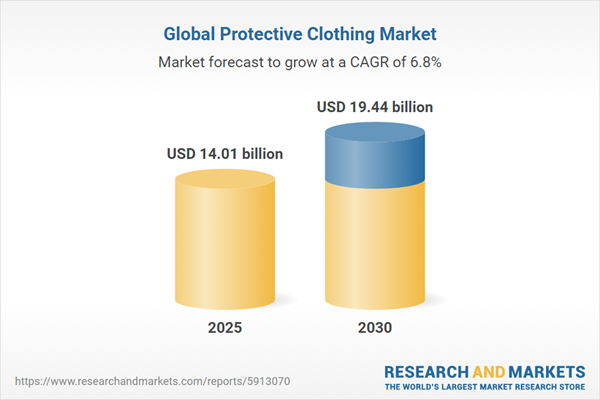The global protective clothing market is experiencing significant growth, driven by the increasing emphasis on worker safety across industrial sectors and stringent government regulations mandating protective gear. Protective clothing, essential for minimizing life-threatening injuries, enhances worker comfort and productivity in hazardous environments. The market is propelled by the expansion of manufacturing, construction, and other high-risk industries, with a particular focus on advanced materials to meet safety standards. Despite challenges such as high costs and the need for continuous innovation, the market is poised for robust expansion, with India emerging as a key growth hub in the Asia-Pacific region.
Market Drivers
Stringent government regulations are a primary driver, enforcing the use of protective clothing in high-risk sectors like oil and gas, where standards such as those set by the U.S. Occupational Safety and Health Administration (OSHA) mandate heat- and flame-resistant attire. These regulations prioritize worker safety and comfort, driving demand for cutting-edge protective gear with enhanced functionality. The rising prevalence of industrial accidents further underscores the need for protective clothing, as it reduces workplace injuries, illnesses, and associated costs like lawsuits and compensation. This safety focus enhances worker efficiency by alleviating stress and anxiety in hazardous environments, boosting market growth. Additionally, the global expansion of industries such as mining, chemicals, and pharmaceuticals increases the demand for specialized protective equipment tailored to diverse risks.Market Segmentation
The market is segmented by end-user and geography. End-user segments include manufacturing, oil and gas, construction, healthcare, mining, and others, with manufacturing and mining leading due to their high-risk nature. Protective clothing in these sectors ranges from flame-resistant suits to chemical-resistant gear, addressing specific hazards. Geographically, the market spans North America, South America, Europe, the Middle East and Africa, and Asia Pacific. India is anticipated to be the fastest-growing country in Asia-Pacific, driven by rapid industrialization and a rising number of workplace accidents in sectors like mining and pharmaceuticals, necessitating robust safety measures.Industry Analysis
Porter's Five Forces model evaluates competitive dynamics, analyzing supplier power, buyer influence, and market rivalry. An industry value chain analysis identifies key players in material production, garment manufacturing, and distribution, highlighting their roles in delivering high-performance protective clothing. The regulatory framework, including OSHA standards and regional safety mandates, ensures compliance and drives innovation in materials like high-strength fibers and flame-resistant fabrics. These regulations foster market trust and support the adoption of advanced protective solutions.Competitive Landscape
Key players focus on developing innovative materials and designs to meet stringent safety standards while enhancing user comfort. The vendor matrix categorizes companies as leaders, followers, challengers, or niche players based on their strategies, with an emphasis on R&D for lightweight, durable, and breathable protective gear. Partnerships and investments in sustainable materials strengthen market positions, addressing both safety and environmental concerns.Challenges
High production costs for advanced protective materials and the need for continuous innovation to meet evolving regulations pose challenges. Additionally, ensuring consistent quality and comfort across diverse applications requires robust supply chain management and technological advancements.The protective clothing market is set for strong growth, driven by regulatory mandates, industrial expansion, and the need for worker safety. India's rapid industrialization positions it as a key growth market in Asia-Pacific. Continued innovation in materials and compliance with safety standards will be critical for overcoming cost and quality challenges, ensuring the market meets the demands of high-risk industries globally.
Key Benefits of this Report:
- Insightful Analysis: Gain detailed market insights covering major as well as emerging geographical regions, focusing on customer segments, government policies and socio-economic factors, consumer preferences, industry verticals, and other sub-segments.
- Competitive Landscape: Understand the strategic maneuvers employed by key players globally to understand possible market penetration with the correct strategy.
- Market Drivers & Future Trends: Explore the dynamic factors and pivotal market trends and how they will shape future market developments.
- Actionable Recommendations: Utilize the insights to exercise strategic decisions to uncover new business streams and revenues in a dynamic environment.
- Caters to a Wide Audience: Beneficial and cost-effective for startups, research institutions, consultants, SMEs, and large enterprises.
What do businesses use our reports for?
Industry and Market Insights, Opportunity Assessment, Product Demand Forecasting, Market Entry Strategy, Geographical Expansion, Capital Investment Decisions, Regulatory Framework & Implications, New Product Development, Competitive Intelligence.Report Coverage:
- Historical data from 2020 to 2024 & forecast data from 2025 to 2030
- Growth Opportunities, Challenges, Supply Chain Outlook, Regulatory Framework, and Trend Analysis
- Competitive Positioning, Strategies, and Market Share Analysis
- Revenue Growth and Forecast Assessment of segments and regions including countries
- Company Profiling: Strategies, Products, Financial Information, and Key Developments among others
Segmentation:
By Type
- Flame Retardant Apparel
- Chemical Defending Garment
- Clean Room Clothing
- Mechanical protective clothing
- Limited General-Use Clothing
By End-User
- Oil and Gas
- Chemical
- Pharmaceuticals
- Aerospace and Defense
- Healthcare
- Government
By Geography
- North America
- United States
- Canada
- Mexico
- South America
- Brazil
- Argentina
- Others
- Europe
- Germany
- France
- United Kingdom
- Spain
- Others
- Middle East and Africa
- Saudi Arabia
- UAE
- Others
- Asia Pacific
- China
- Japan
- South Korea
- India
- Indonesia
- Thailand
- Others
Table of Contents
Companies Mentioned
- DuPont
- Honeywell International Inc.
- MCR Safety (Acquired by Bunzl Plc)
- Lakeland Industries, Inc.
- MSA Safety Inc.
- 3M.
- ANSELL LTD.
- Protective Industrial Products, Inc.
- ILC Dover LP
- Alpha Pro Tech, Ltd.
Table Information
| Report Attribute | Details |
|---|---|
| No. of Pages | 144 |
| Published | August 2025 |
| Forecast Period | 2025 - 2030 |
| Estimated Market Value ( USD | $ 14.01 billion |
| Forecasted Market Value ( USD | $ 19.44 billion |
| Compound Annual Growth Rate | 6.7% |
| Regions Covered | Global |
| No. of Companies Mentioned | 10 |









